
 A Minnesota PBS Initiative
A Minnesota PBS Initiative
My Dad's stories of his experience with the Navy in WWII are what got me interested in Asia. After college, I served with the Peace Corps in Bihar State, India, during 1964-66 working in poultry production with village farmers. Bihar is an extremely poor part of India, and It was a good introduction to village development work.
USAID wanted to capitalize on our Peace Corps experience to create a rural pacification program in Vietnam. I was excited to be chosen. During 1967-1970, I served as a Foreign Service Officer assigned to the CORDS pacification program in the Mekong Delta.
Besides occasionally going along on military operations, I usually traveled by myself visiting my villages 2-3 times a week. Visits typically took most of a day looking at village conditions and discussing project ideas.
After a year's language training, I lived and worked as the only civilian member of a 14-man Army pacification team. Our task was to improve security in the 8 villages of Cai Be District. located 35 miles west of My Tho on the Mekong River. As a Vietnamese speaker, I worked with the village chiefs to organize development projects in education, agriculture and transportation.
Besides occasionally going along on military operations, I usually traveled by myself visiting my villages 2-3 times a week. Visits typically took most of a day looking at village conditions and discussing project ideas with the village chiefs and their council members.
Most bridges and culverts has been blown up by the VC. This impeded the marketing of agricultural products as well as the flow of water needed for rice cultivation.
Working with Maj. Lou Higginbotham of U.S. 9th Division, I helped organize village forces to dig in new irrigation culverts in order to open up new areas to rice production. I also helped organize re-construction of destroyed bridges so that small trucks could again reach outlying hamlets. In addition, village schools, irrigation canals, side roads and the district health dispensary were rebuilt. The VC left all of my culverts alone, because they benefited all farmers including themselves.
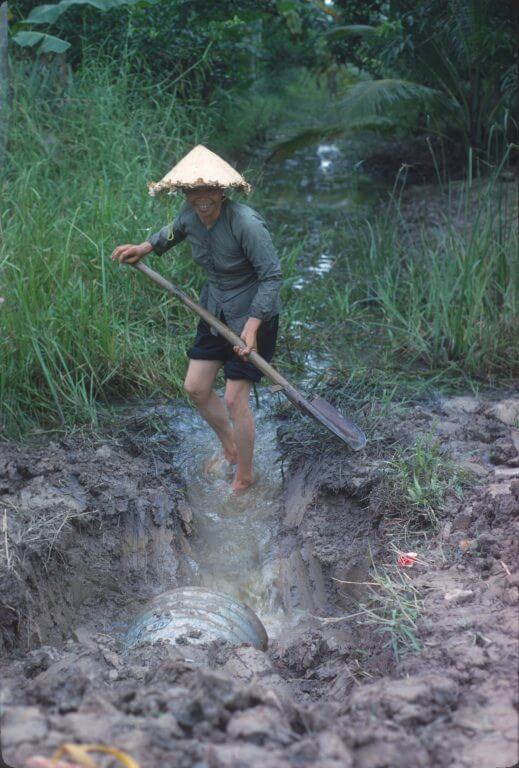
Woman digging in new USAID culvert to irrigate her orchard. Cai Be District, 1969. Photo by Bill Graham.
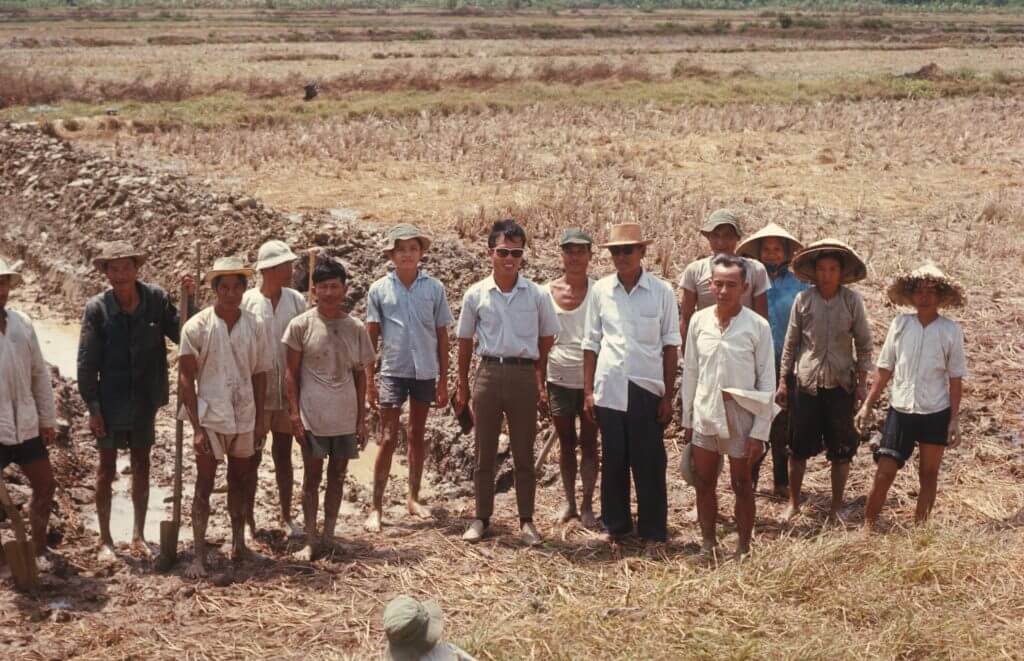
My counterpart, Tran, with Phu An Villagers digging out an irrigation ditch. Chau Thanh District, 1970. Photo by Bill Graham.
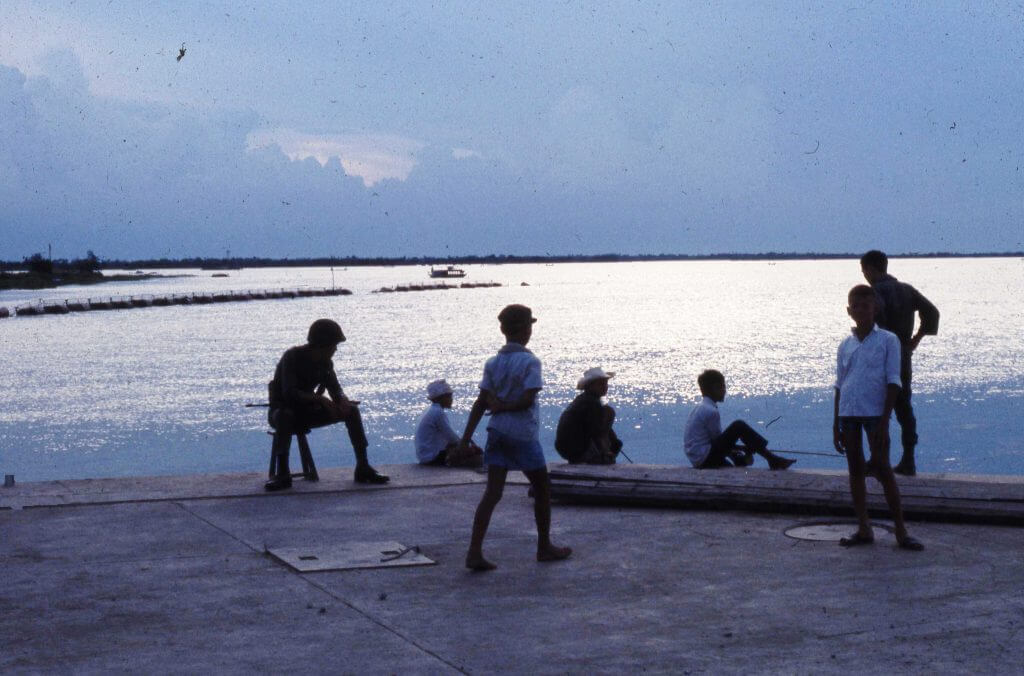
Mekong River at Cai Be looking west at dusk under monsoon sky. 1969.
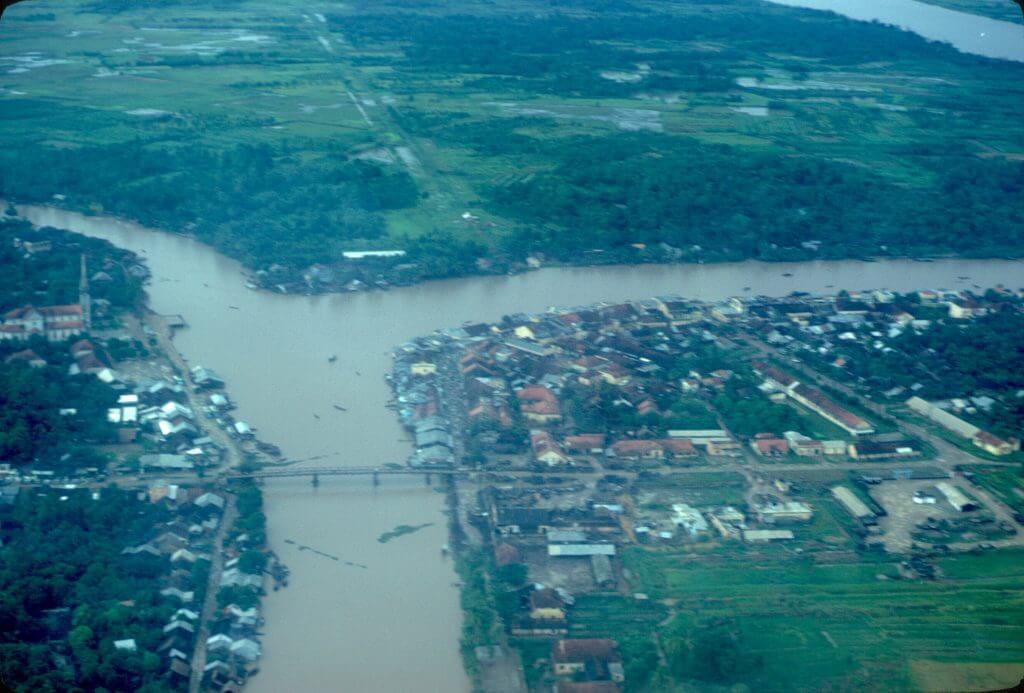
Cai Be Town looking east, 1968. CORDS advisory compound at lower right. About 4,000 residents. Photo by Bill Graham.
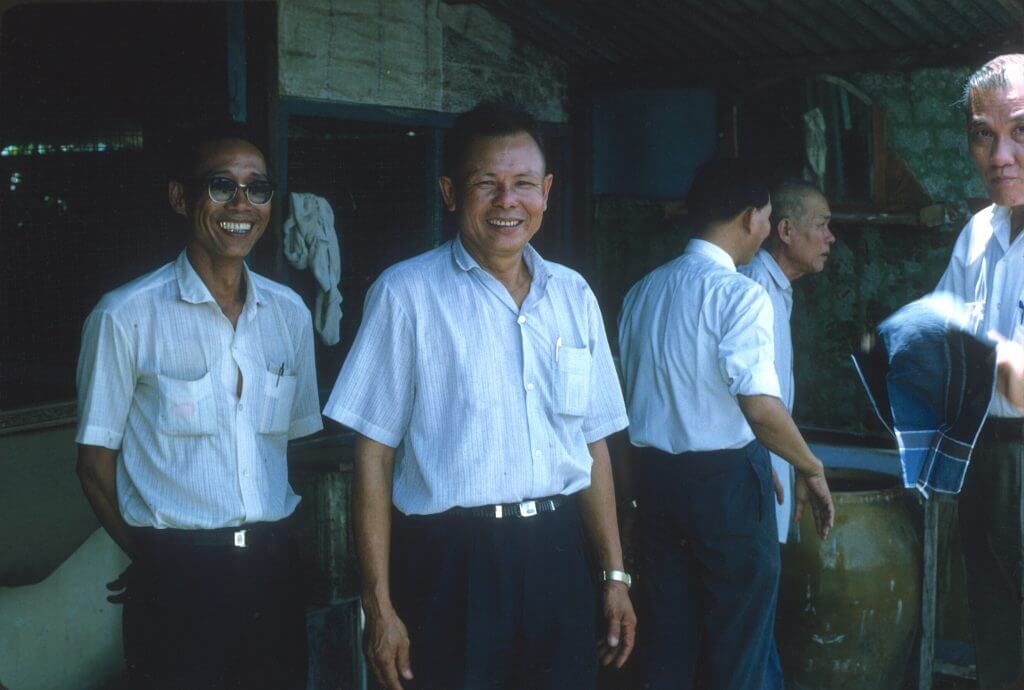
Ong Xi (left), Cai Be Village Chief with Ong Tinh, council member. Cai Be, 1969. Photo by Bill Graham.
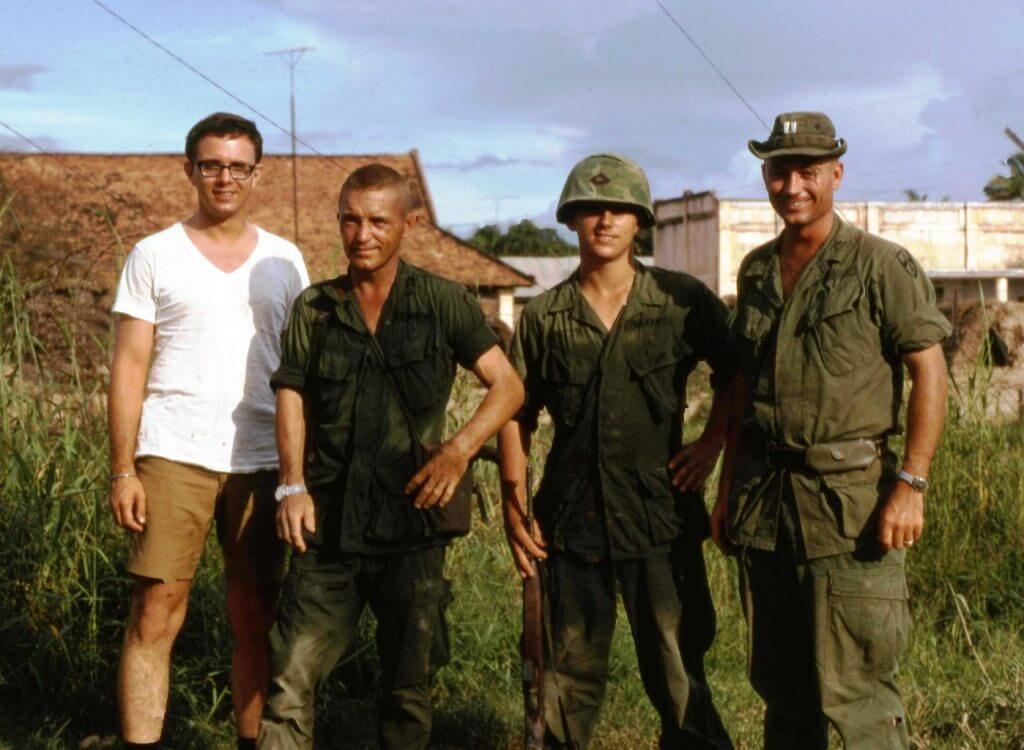
CORDS advisory team. (L-R) Bill Graham, Maj. Bill Elsten, Spec.4 Parker and Cpt. Rick Gillespie, Cai Be advisory compound, 1968. Photo by Bill Graham.
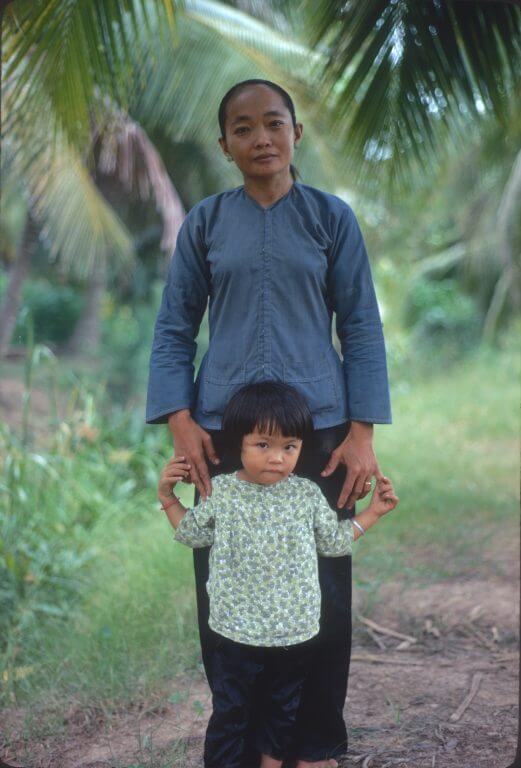
The Asian Christian Society, a medical missionary group supported by World Council of Churches, operated a clinic in Cai Be. Their leader, Dr. Bui Quang Chieu, had been the first Vietnamese woman to graduate from a western medical college, in 1931 from the Sorbonne in Paris.
Dr. Bui and her team visited the villages each week to treat war casualties. One of our advisory team members was Spec. 4 Herbie Mitchell, our field medic and a conscientious objector. Herbie was unarmed and accompanied Dr. Bui's team in their big sampan as they traveled around the district. Since the Asian Christians were officially neutral as to the war, both sides left them alone and Herbie was entirely safe when traveling with them, even in contested territory.
I found that I was rubbing elbows with members of the Viet Cong every day, and that when it suited them, my safety was assured. On countless occasions, I was aware that I could be easily kidnapped or killed by the VC, but it seemed that perhaps I led a charmed life. For example, I could drive to Hoi Cuu Village with new culvert sections and never worry about land mines, even as other vehicles routinely were attacked and blown up on the same road.
For the Vietnamese, it seemed like our war never had happened. They referred to it as "hoi xua," meaning "back in the ancient time." The Vietnam that had lived in my memory for 25 years was gone and forgotten. That helped me realized that it the war really was over.
A member of our American advisory team was killed on that very road in 1969. He was a Minnesotan with a family who had been my friend. Our Vietnamese district chief, Cpt. Le Minh Hoang, was killed during an operation in the northern part of the district. He had been a fine officer and friend to all of us Americans. Villages were attacked and bombed where dozens of civilians were killed or wounded. It was common to find dead civilians laid out along the road. An American plane dropped its ordinance on one of my villages, and I had to convey apologies and money to the survivors on behalf of our Government. Gradually it became clear that our war was going nowhere, and that America needed to leave Vietnam so that peace could be restored.
In 2001, my sons Will and Tony accompanied me on a return visit to Vietnam. We started in China and rode trains, motorcycles and airplanes all the way south, ending up in my old town of Cai Be. The North Vietnamese had treated the southerners very badly after their victory in 1975, as corroborated by several conversations with former South Vietnamese soldiers who had survived "re-education camps."
Nonetheless, it was obvious that the united Vietnam had done remarkably well and that considerable wealth had found its way down to common people in the villages. Thousands of new masonry homes were being built. Roads were re-opened, blacktopped and improved. The population had exploded, doubling in only a generation. Power lines, internet and cell phones had invaded in force.
Most interestingly, most Vietnamese I met had not yet been born when the war ended. It was a forgotten interlude, their fathers' war, something not relevant to themselves. Vietnamese routinely traveled abroad, even to the United States. They spoke optimistically about their futures.
For the Vietnamese, it seemed like our war never had happened. They referred to it as "hoi xua," meaning "back in the ancient time." The Vietnam that had lived in my memory for 25 years was gone and forgotten. That helped me realized that it the war really was over. In writing my memoir on Vietnam, I came across a number of recent authors who helped me put my experience into wider perspective. I now see the war as stemming from misunderstandings about actual conditions in Asia, our own political intrigues, and ill-based fear of threats from abroad.
A strong case can be made that Vietnam was a war America should not have fought. Wiser leadership could have nipped it in the bud in the 1940's, and surely could have extricated America from it by the early 1960's. Nixon's decision in 1969 to "bomb them into submission" was foolhardy and probably a war crime.
Finally, I believe that Vietnam illustrates why it is so critical for Americans to be informed of world events and to insist on having a say in our government's decisions to go to war.
Our wars in Vietnam, and later in Iraq and Afghanistan, have sapped our treasury, disrupted our lives, squandered our ideals and made our government less believable. All that has made it harder for Americans to accept leadership and to keep our role as world leader.
And in the end, our efforts in these wars have not produced the objectives we wanted.
Story Themes: 1967, 1968, 1969, 1970, Asian Christian Society, Bill Graham, Burnsville, Cai Be, Chance Encounters, Civilian, CORDS, Death and Loss, Dinh Tuong Province, Dr. Bui Quang Chieu, Look, Lou Higginbotham, Mekong Delta, Pacification, Peace Corps, Re-Education Camps, Reflection, Viet Cong, William Graham